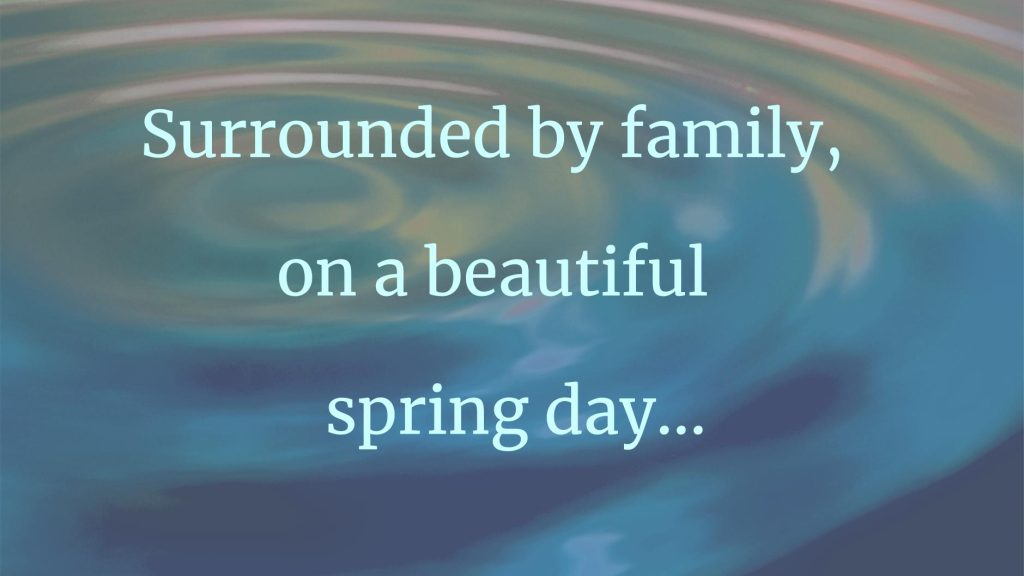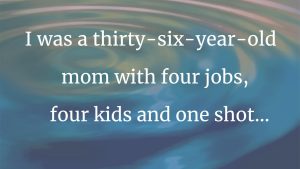All too often in my forty years of practicing medicine, I’ve seen patients die hard, lonely deaths—lying on a stretcher under the emergency department’s glaring lights, or all alone in an ICU bed.
In extreme situations, the patient is covered in medical equipment: a breathing tube in the mouth, defibrillator pads on the chest, monitor leads on the torso, IV lines dangling from the neck and arms. When family members finally enter the room, it’s heart-wrenching to see them weep over their loved one, to whom they never got to say goodbye.
But it doesn’t always happen this way.
Last spring, when my wife Julia’s Uncle Ralph passed away in his nineties, the whole family had an entirely different experience.
Ralph had led a vibrant life, full of joy and laughter. As a husband, father, grandfather and uncle, he was beloved for his lively, humorous spirit. As a high-school biology and math teacher in Milwaukee, he’d brought great vitality to his classes, and in retirement he continued as a volunteer teacher.
In winter of 2021, at ninety-two, Ralph was diagnosed with metastatic cancer and given six months to live. Upon hearing the news, he decided that, rather than suffering the side effects of chemotherapy or undergoing high-risk surgery to gain a few more months of life, he would devote his final months to spending time with his cherished family.
That January, he pursued his favorite activities—indoor gardening, painting watercolors and cooking with his family. One February weekend, his grown twin granddaughters came to visit and spent several happy hours in the kitchen with Ralph as he taught them how to make cinnamon bread with a perfect swirl.
Sadly, Ralph’s cancer marched on relentlessly, riddling his body and zapping his strength. When he tried to FaceTime with his two beloved nieces, he felt too weak to talk for very long. By March, only three months after his diagnosis, he decided that it was time to move to the nearby hospice-care facility he’d chosen.
We were told that Ralph had only days to live at most, so my wife Julia and the rest of the family set a date when everyone could travel from their respective homes to visit Ralph in Milwaukee and say their final goodbyes.
Very early one Saturday morning, Julia and I drove to the facility. There we met Ralph’s two granddaughters, who’d driven from Madison. His wife, Elaine, and daughter, Ellen, had arrived the night before.
Due to COVID restrictions, Ellen and Elaine were the only relatives allowed to visit Ralph that day.
The rest of us were told that we had to wait twenty-four hours for Ralph’s COVID test results before we could see him in person. This posed a quandary: Should we stay until nighttime, in case Ralph suddenly took a turn for the worse? Or should we come back the next day, when his test results were available, and risk missing the chance to say goodbye to him?
“Well, Dad’s room is on the first floor, and it looks out onto a small patio,” Ellen said. “Why don’t you walk along the path behind the building, and I can wave to you from his window?” This plan was enthusiastically adopted.
As we walked along the pleasant path amid patches of melting snow, the early morning sun was just beginning to warm the grounds, and birds chirped in the leafless trees. We passed a small, half-frozen pond, rounded the building corner—and there was Ellen, waving from Ralph’s window.
“Ellen, can you open the window so the twins can sit on the windowsill?” I asked, having discovered that the screen could be removed.
Now Ralph could clearly hear Julia and the twins telling stories and reminiscing fondly about their times with him. Even though he was sedated, Ellen saw him trying to open his sunken eyelids; a faint smile appeared on his chapped lips.
Across the pond stood a gazebo, full of wooden benches stored for the winter. I freed one and carried it over to Ralph’s small patio, now lit by the morning sun. The twins sat on the bench with Julia between them, sharing a collage of photos that Ellen had collected and digitized.
A highlight of the collage was a video of these same granddaughters at age four, snuggling and giggling with Ralph as they all sang “We’re Off to See the Wizard” and “Over the Rainbow.” For me, it was priceless moment, hearing the twins’ high-pitched singing mingle with Ralph’s deep baritone while the grown twins laughed and clapped in time with the music.
“When Ralph heard that, his eyes started to water, and he squeezed my hand and tried to turn his head towards the singing,” Ellen told me.
Later that afternoon, Julia crouched by the low-set window and recalled for Ralph how, when she was a little girl, he’d taught her to place a worm on a hook to catch fish. She reminded him of how they’d gone for lunch, leaving their “catch of the day” dangling in the water, and had returned to find it half-devoured by turtles.
Julia’s brother Mike arrived and told stories of how Ralph played catch with him after school. “He taught me how to bat a ball, throwing soft-lob pitches.”
The sun set in the west, and the patio turned colder, but our hearts were warmed by the time we’d spent together, sharing our love for Ralph.
Meanwhile, inside, Ellen was holding Ralph’s hand as he took his last breath.
All of us felt thankful that we’d arrived in time to see Ralph and to reach a sense of closure and acceptance of his passing. We felt good for the fond memories we’d shared with him—especially since Ralph had always let us know that he loved us. And we felt comforted by the peaceful, almost magical experience we’d shared on that beautiful spring day.
It is my hope that, as more hospitals provide social services, palliative care and hospice facilities, it will someday become the norm for terminally ill patients to die as Ralph did: peacefully, pain-free and surrounded by the people they love.









9 thoughts on “Going in Peace”
Thank you, Tim, for writing this.
As a member of the family (I am Ralph’s youngest niece) who lives in Montana, I was not in attendance for this goodbye, but as I was reading I could see my loved ones as they were that day. You’ve drawn a tender and human picture of what so many of us fear: spending time with and saying goodbye to our loved ones as they are dying.
In your reminescence of that day, you make clear that we needn’t worry about “not knowing what to say,” or “how to act” when we visit the dying — all we need do is the best we can — even when it means taking down window screens and saying goodbye from a window ledge. Your story shows us that there is no “right” or “wrong” way to be with those we love and that, where love is present, we’ll always find a way.
Thank you again for this touching and vivid picture from one who was unable to be there.
Truly an act of love for this family to arrange to visit their beloved family member as he was dying and reminisce about days long ago with him to help him ease out of this world and into the next. Beautiful.
Sherri,Thanks for your comments. The serendipity with which the events of the day evolved and the “magical” moments of videos and stories was truly special.
I can’t say enough good things about the Hospice in West Palm Beach FL where my mother spent her last five days. She, too, had a patio outside her window, a sofa that folded out for a visitor to sleep on if staying overnight, microwave, bath with shower, volunteers who came around to offer snacks and a glass of wine if wanted. An atrium filled the general area next to the nurses station and there was singing off and on. This was before the Pandemic. My health didn’t allow me to care for mother in in-house Hospice so I was grateful she had a beautiful place for me and my cousins to be with her. Your experience sounds like such a good way to say goodbye.
Pros, Thanks for your kind words. Ralph’s passing was certainly better than what I have seen in an ICU.
Sorry, Pris not Pros. I have a big thumb.
With a rapid onset of symptoms and a diagnosis of glioblastoma, my beloved husband of 52 years died just a year ago. With the diagnosis he had surgery and then made the choice to forego chemo and radiation which only offered a few more months of life and a difficult treatment process. He was transferred to a long term care unit and wIth hospice, as a family, we were able to say our goodbyes with stories, laughs, music, tears and prayers. Covid complicated things however, as his wife, I was able to be with him at the bedside. My lasting memory will be when I climbed into bed with him and held him close just as we had done over years in our marriage. I will never forget the warmth of his body and the smile on his face knowing I was there with him.
We all will die and the health care providers who helped us through this time are just as special and important as their colleagues in the ICU. Both my husband and I are life long health care providers and for the care we received, we are most grateful.
So sorry for your loss, but love your lasting memory. Beautiful!
Judith, Thanks for your kind words. Healthcare us a heat profession.